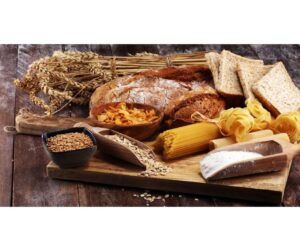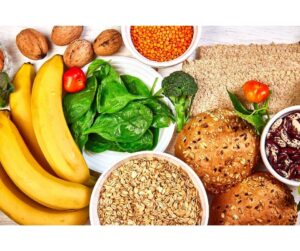Carbohydrates Broken Down
Across the world, carbohydrates serve as one of the main sources of energy in our daily diets, and they are usually the first thing that is removed when individuals are trying to lose weight or get healthier. But not all carbohydrates are created equally and can benefit your health.
We can break carbohydrates down into complex or starchy carbohydrates, free sugars and fibre.
Complex Carbohydrates:
These are usually from whole, plant-based foods and are a good source of energy, as well as a variety of nutrients. All carbohydrates are broken down into glucose, but complex carbohydrates are broken down slower, helping to reduce spikes in our blood glucose levels.
Examples include:
• Potatoes – with skins on
• Bread – choose wholegrain, wholemeal, or brown
• Cereals – choose wholegrain versions with low added sugar and salt
• Rice and Grains – brown rice, couscous, bulgar wheat
• Pasta – choose wholewheat or wholegrain versions
Free Sugars:
Free sugars are any sugars that are added to foods, and they can be present in honey, syrups, fruit juices, biscuits, chocolate, cakes etc. These sugars are broken down into glucose quickly and can cause blood glucose levels to spike. Therefore, it is important that we minimise these free sugars in the diet where possible. However, sugars from natural sources such as milk or fruit do not count as free sugars. It is recommended that adults consume no more than 30g of free sugars a day.
Fibre:
Fibre is an essential part of our diets, but in the UK, we are not consuming enough of it. It is recommended that we consume 30g a day but we are on average only consuming 17-20g. Eating a good level of fibre is associated with a lower risk of developing heart disease, bowel cancer, strokes and type 2 diabetes, as well as helping you feel fuller for longer, improving digestion and preventing constipation.
Examples include:
• Bread, pasta and rice – choose brown, wholemeal or granary versions
• Potatoes – with skins on
• Pulse – beans, lentils or chickpeas
• Fruit and vegetables
• Cereals – choose wholewheat biscuits, shredded wheat, porridge, bran flakes etc
To find out how you can improve your consumption of carbohydrates and help stabilize your blood glucose spikes to improve your type 2 diabetes, you can sign up for our subscription packages and you will get our continuous glucose monitor, as well as help from our coaches.
References:
BDA (2021) Carbohydrates: Food Fact Sheet. Available at https://www.bda.uk.com/resource/carbohydrates.html (Accessed on 10 November 2022).
Ferretti F and Mariani M (2017) ‘Simple vs Complex Carbohydrate Dietary Patterns and the Global Overweight and Obesity Pandemic’, Int J Environ Res Public Health, 14(10), pp. 1174.
NHS (2022) How to get more fibre into your diet. Available at https://www.nhs.uk/live-well/eatwell/digestive-health/how-to-get-more-fibre-into-your-diet/ (Accessed on 10 November 2022).
NHS (2020) Starchy Foods and Carbohydrates. Available at https://www.nhs.uk/live-well/eat-well/foodtypes/starchy-foods-and-carbohydrates/ (Accessed on 10 November 2022).
